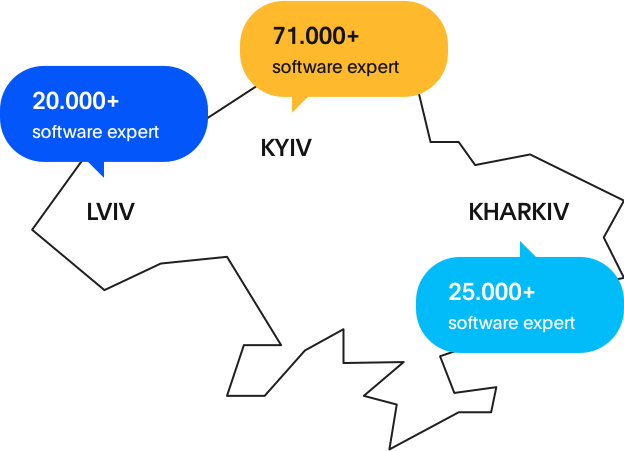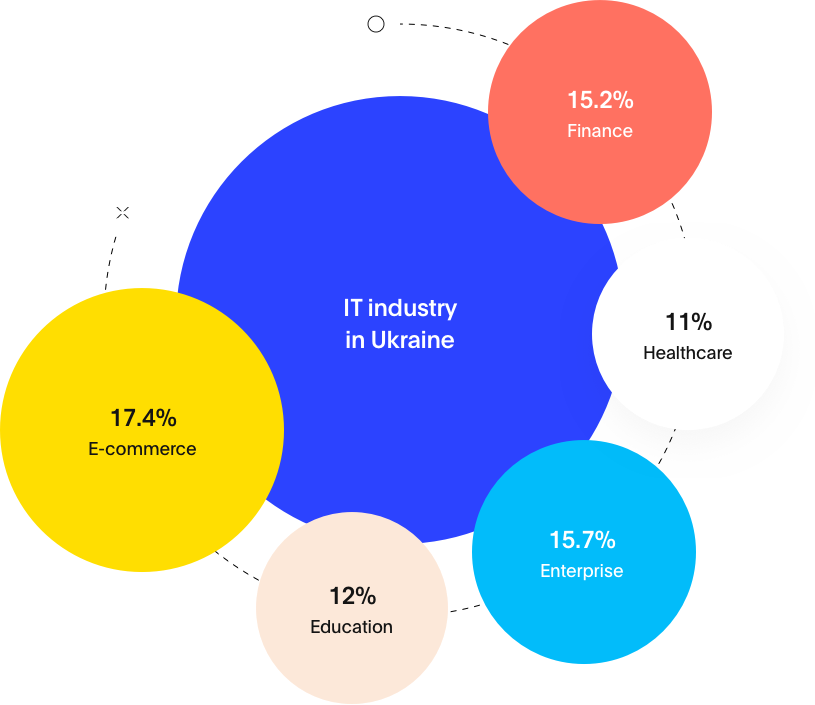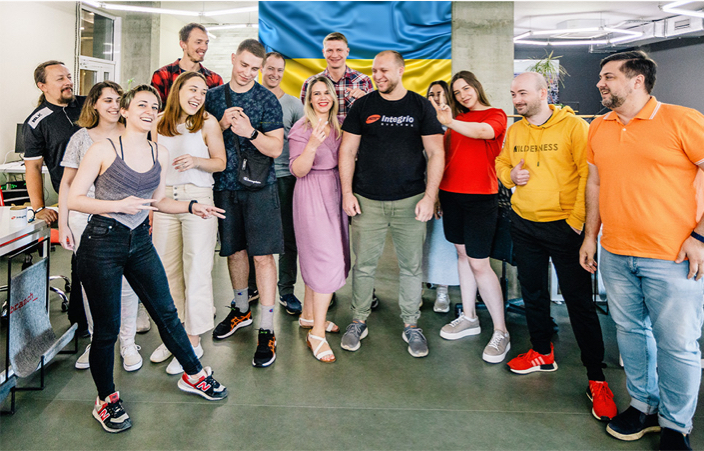GitLab's is a classic story: a tech company goes to a Silicon Valley incubator, makes its pitch, and turns seed money into explosive growth. Founded by Ukrainian developer Dmitriy Zaporozhets and Dutch developer Sytse Sijbrandij, GitLab's mission was to build powerful tools for software developers with every single employee working from home. At the beginning, it had just a handful of personnel; today, it has more than a thousand fully remote employees in forty-five countries who use video calls and Slack chats to collaborate. With revenues in the hundreds of millions, GitLab sits on the top list of skyrocketing companies.
Stand with Ukrainian IT
The IT sector thrives on quantification. Server loads, database sizes, connection speeds: a whole universe of figures underpins modern life. Yet for all the things in the world that can be counted and defined, no one can measure two with the power to change the course of history: faith and human will.
It is hard to believe that the work of years can collapse in a day. It might be even harder to believe that people can wake up the day after and start building anew, but that is what the Ukrainian IT sector has chosen to do.
Since February 24th, the IT professionals of Ukraine have lent the utmost support to our country. According to a survey conducted by the Ukrainian IT Association, nearly 2% of all IT professionals have joined the armed forces. In some small companies with fewer than 200 employees, fully a fifth of their specialists have joined the army. Nor is this the only way we are helping. Our sector pays taxes in advance, supports civilians and the military with humanitarian aid, and marshals its own cyber warriors for the digital front.
During this crisis, Ukraine's IT community has come together to work as one for the good of all. Thanks to Integrio Systems' own efforts and the help of our partners, 100% of our employees have been able to reach safety in top IT locations in Ukraine and Europe. As a result, every current and future project you entrust to our team of professionals will support our economy and help save lives.

We love our work and have always dedicated ourselves to providing world-class quality; we love our country and dedicate ourselves to making it better every day.
An overview of Ukraine's IT sector
Ukraine is the birthplace of some of the biggest names in tech around the globe.
Gitlab, Grammarly, Ajax Systems, People.ai, and Restream are all startups with Ukrainian roots. With an annual growth rate of 25–30% and around 300,000 employees, Ukraine's IT sector is also one of the most dynamic in all of Europe.
The IT industry in Ukraine concentrates mainly on developing software solutions for e-commerce (17.4%), enterprise (15.7%), and finance (15.2%). Education and healthcare are also key focus areas, accounting for 12% and 11% of activity respectively.

Though recent events have had an impact, this sector is resilient: currently more than 70% of IT professionals work in safe regions of Ukraine, with another 16%, mostly women, working abroad.
Seventy-seven percent of companies have retained nearly all of their customers and contracts, keeping the industry financially stable.
International partnerships
Resilience under fire: returning to work amid the Russian invasion
The Russian invasion of Ukraine has taken a toll on tech workers, with 6% of survey respondents reporting job loss due to the war.
That figure may improve in the coming month, however, as outside companies begin to work with Rozetka, EVO, Nova Poshta, and Parimatch Tech for business optimization.
A month after the start of the war, the majority of Ukrainian IT specialists have already returned to work.
Eighty-four percent of respondents are back at work full-time, with another 7% working part-time.
Nearly all (93%) of DevOps/SRE specialists are working full-time, as are 88% of developers and managers, 87% of QA specialists, 86% of data scientists, and 85% of human resources
Six percent of respondents are searching for work. Some fields have been hit harder than others, with 18% of sales specialists and system administrators looking for a job, as well as 15% of support specialists and designers and 13% of marketing specialists.
Only 3% of respondents noted that they had been mobilized, although the true proportion of all IT workers mobilized may be slightly higher, as some may not have internet access.
Some (6%) IT professionals have had more work since the beginning of the war rather than less. Top-level managers and executives were most likely to report this, with 12% noting increased workloads as businesses adapt to wartime conditions.
More projects have not translated to greater income, however: 76% of those with heavier workloads said that their income had stayed the same, while another 10% said their income had slightly decreased. On the other hand, nine out of ten of those still employed said their incomes have stayed unchanged or have hardly changed, and of those who had fewer projects, 58% were able to maintain their income, versus 37% who saw it decline.
Cyberfront
Russia is waging its war against Ukraine from every angle of attack. With land, sky, and sea already under merciless assault, another front has officially opened in our country: the digital one.
Thanks to the coordinated effort of volunteers and the support of government organizations, Ukraine has built an IT army to fight back against Russia's incursions. Nor are they fighting alone. Volunteers around the world are helping turn the tide. These cyber warriors systematically block hostile sources of propaganda. Dozens of Telegram, YouTube, Facebook, Instagram, and TikTok accounts that were spreading disinformation and leaking the positions of Ukrainian armed forces have already been shut down.
At the same time, digital sleuths analyze photos and videos Russian soldiers post to personal accounts to help Ukrainian forces identify and neutralize enemy troops.
IT specialists have also created a game that targets Russian websites without any additional programs.
A single player can send 15,000 blocking requests per hour, and anyone with a laptop and an internet connection can join. Dedicated cyber warriors coordinate DDoS attacks, providing detailed instructions even a beginner can follow.
Ukraine's startup start
Though a young state, Ukrainian business and industry are developing rapidly. Our vital tech industry is ever-evolving, bringing products and services to the market that change people's lives. At the forefront of that innovation are some of the most highly valued startups in the world
The growth of a startup is not unlike advancing through levels in a video game. From the start of a great idea to reaching sustainability, all businesses have to go through the same stages, and in order to progress, they have to think strategically, plan ahead, and learn from their experience. In that way, every startup's story is the same, but in every other, each is unique. Here are three of the most vibrant tech startups to come out of Ukraine.
GitLab
#1Grammarly
#2In 2009, Ukrainians Maksym Lytvyn, Oleksiy Shevchenko, and Dmytro Lider founded an online grammar checker powered by an AI meticulously trained in the English language. At the heart of Grammarly's success is a simple idea: countless people around the world need to communicate in written English, and almost no one's skills are ideal. Today, Grammarly is one of four startups with Ukrainian roots valued at more than $1 billion. Thirty million people use Grammarly every day. According to Lider, the company's current goal is to make Grammarly available anywhere anywhere users have the option to write in English
Ajax Systems
#3How can a startup break into a world market already crowded by thousands of competitors? After a business trip to China, Oleksandr Konotopskyi was inspired to create a smart, wireless security system that would render all the faceless "white boxes" on the walls obsolete, and Ajax Systems was born. Ajax has grown into an international, multimillion dollar company that proves Ukraine's tech exports can outperform even the biggest manufacturers to become a household name around the world.
A part of Ukrainian IT community
The Ukrainian development center has been a huge part of Integrio's business growth
Our team is made up of amazing, passionate people who are experts in their fields. We know that they will continue to create phenomenal products for clients all over the world.
In this dark time, we are proud to join with the local and global IT community to serve our country. Armed with industry-leading skills in Java, JS, .NET, and AI, we will stay firm in our purpose to give back through charitable works. We are also grateful that our clients in logistics, aviation, real estate, and enterprise are providing invaluable assistance in this crisis. It is an honor for us to be a part of the Ukrainian IT community, and we would be honored for you to join us, too.

We build our solutions to make doing business better, and we aim to become a milestone of success for you. Thank you for supporting Ukraine!
Learn more